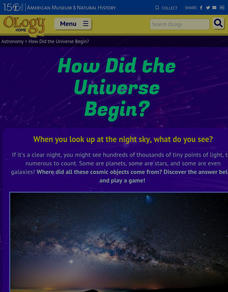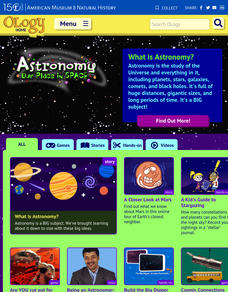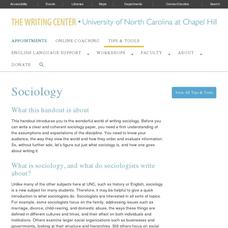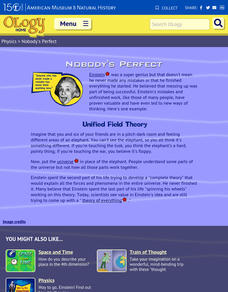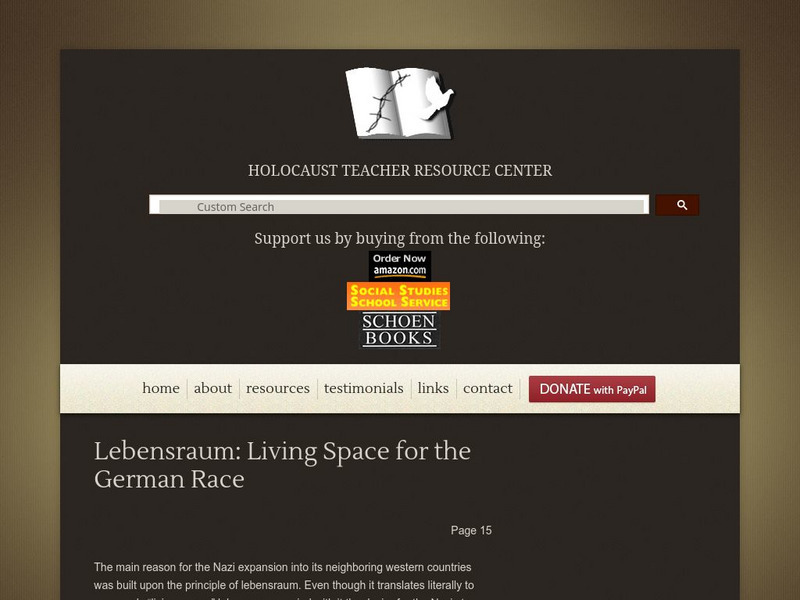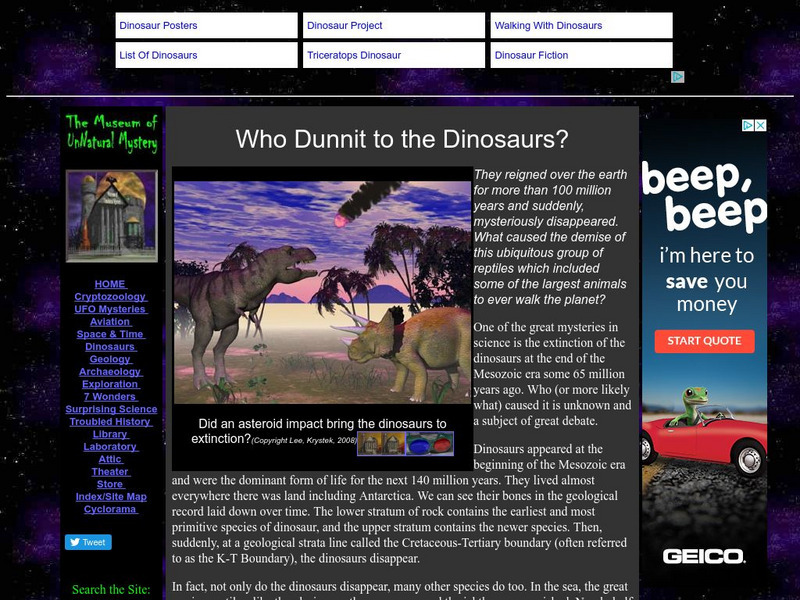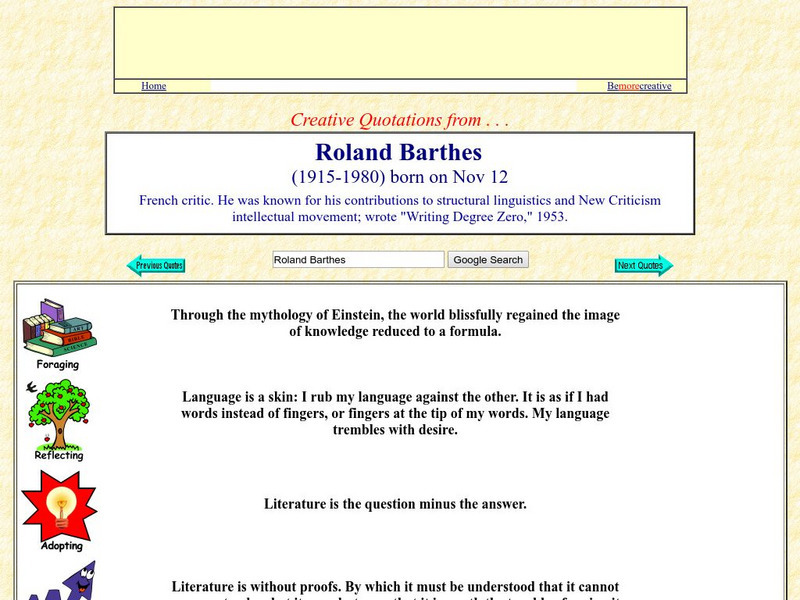American Museum of Natural History
How Did the Universe Begin?
The Big Bang Theory is more than a television show. Pupils read how Edwin Hubble observed other galaxies and noticed that the galaxies are moving away from each other. Scholars learn about the idea of the big bang and what happened next...
University of North Carolina
Music
Music is a universal pleasure, but writing about it can be a little trickier. An informative handout discusses common types of music writing assignments that one might encounter in a college-level course. Individuals read about musical...
American Museum of Natural History
Planetary Mysteries
A website all about planetary mysteries—it's a one-stop-shop for all things, stars, planets, and space travel. Scholars read an astronomy overview to discover the page's big ideas, then choose from the plethora of resources, including...
American Museum of Natural History
Train of Thought
Hop aboard the train of thought. A remote learning resource has learners consider thought experiments to consider scientific theories. It provides two examples, one on orbiting bodies and the other on the speed of light, for them to work...
American Museum of Natural History
Space and Time
Carve out some time to learn about space-time. Young scientists use a remote learning resource to read up on the relationship between space and time. They consider the idea of relativity, see how objects with a large mass can bend space...
University of North Carolina
Sociology
What exactly does sociology entail? Sociology is a broad field that covers many topics, including culture, mass media, and social movements. A helpful handout prepares scholars for typical writing found in college-level sociology...
American Museum of Natural History
Nobody's Perfect
Even Einstein made mistakes, you know. A remote learning resource explains how scientists are sometimes unsuccessful. Pupils learn about Einstein's failed quest to find a unified field theory that explained the entire universe.
Curated OER
Bermuda Triangle
Young scholars explore what the Bermuda triangle is and the theories as to why it is so mysterious. In this mystery lesson students read and discuss the history and the mystery behind the Bermuda Triangle.
University of North Carolina
Political Science
The right to vote and freedom of expression are democratic principles that fall under the study of political science. A handout describes writing assignments that are common in political science college classes and gives tips and...
Other
Learning theories.com: Summaries of Learning Theories and Models
Lists many models and theories of learning. Each one links to the summary of an article. A paid subscription is necessary to access the full article. But if a definition or brief explanation of a term is needed, the summary should...
Digital History
Digital History: Three Theories Explaining Imperialism [Pdf]
Read about three theories of Imperialism and how actions by the United States in the late 19th and early 20th centuries were driven by one or perhaps all three of the theories.
Victorian Web
The Victorian Web: John Ruskin
This site from The Victorian Web provides an excellent variety of resources about Victorian author John Ruskin. It takes one from a detailed biography and relative social and political history, to themes, critical theory, and information...
Florida State University
Florida State University: Science, Optics & You: Albert Einstein
Biography of Albert Einstein (1879-1955), one of the most famous physicists of the last century, best known for his theory of relativity.
National Health Museum
Access Excellence: Louis Pasteur (1822 1895)
This Access Excellence site provides information on the scientific achievements of Louis Pasteur, one of "the greatest benefactors of humanity."
Other
Lebensraum: Living Space for the German Race
Resource provides a discussion of the concept of "Lebensraum," or "living space" for the German people. This was one of Hitler's main justifications for his military conquests.
Other
Who Dunnit to the Dinosaurs?
"One of the great mysteries in science is the extinction of the dinosaurs at the end of the Mesozoic Era some 65 million years ago. Who (or more likely what) caused it is unknown and a subject of great debate." Many theories are touched...
Other
Carbon 14 Dating
Seven pages all about Carbon 14 Dating. Information on half-life, Carbon 14 used to date specimens and artifacts, limitations, charts and graphs. Michael E. Brown Ph.D. contests that the limitations of Carbon 14 dating support the theory...
Other
Dinosaur Facts
There is plenty of information about dinosaurs here for students doing research. There are a fair number of ads but they are mainly related to dinosaurs. Besides fact pages for hundreds of dinosaurs, you will find information about...
BBC
Bbc: History: Edmund Burke (1729 1797)
A one-page summary of the life and philosophy of influential eighteenth-century Anglo-Irish Parliamentarian Edmund Burke, whose theories of government led him to sympathize with the American colonists against the British crown, to...
Baertracks
Creative Quotations: Roland Barthes
This is a brief but interesting site from Creative Quotations that is devoted to Barthes' major quotations dealing with literature and criticism. He was the major structuralist critic of modern times.
NASA
Nasa: Beginner's Guide to Aerodynamics
Includes exhaustive information and a wealth of activities pertaining to aerodynamics and the physics of flight.
Ducksters
Ducksters: Biology for Kids: Mendel and Inheritance
Explore how genes are passed from one generation to the next including Punnet squares. Kids learn about Gregor Mendel and his theories and experiments on inheritance and genetics.
